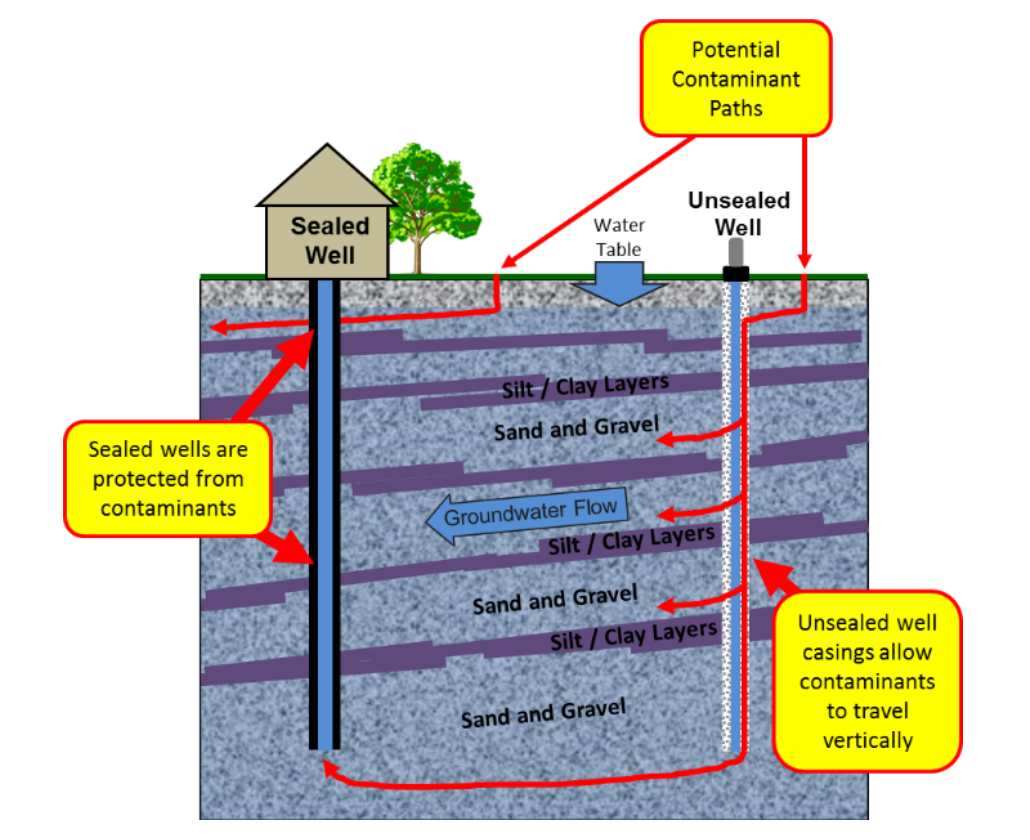The City of Meridian relies on groundwater as its only supply to meet the community's drinking water needs. The City’s supply system includes 25 wells located all around the City that pump water into an integrated distribution system.
When new City wells are constructed, the City takes great efforts to explore water quality at different depths beneath the ground surface in order to find safe drinking water free from harmful contaminates. This is done by constructing “test wells.” Some areas have natural contaminates like uranium, and some areas have contaminates introduced by human activity like fertilizers and pesticides from farming, or chemicals from industry. Natural barriers like clay layers keep contaminates from moving up or down in the aquifer system.
After finding the best quality water, the City constructs wells with full-depth well seals (from the selected depth to ground surface) so water is extracted only from those selected areas. These full-depth seals are made using a special grout that is pumped into place. The seals ensure that the natural barriers, like clay, stay intact and continue to prevent the vertical movement of contaminates. The City takes the responsibility of delivering safe water very seriously. The total investment to bring a City well online is over $3.6M.
But, what happens when other wells are built that don’t keep protective barriers intact? When wells are constructed and not properly sealed, they create “holes” in the natural protective barriers allowing vertical movement of water and contaminates within the aquifer system. As the City has learned more about the aquifer system through the development of its supply wells, it has become clear that the primary threat to the City’s source water is the construction of unsealed wells.

In September 2016, the Idaho Department of Water Resources (IDWR) denied Meridian’s request to establish an Area of Drilling Concern, explaining that more data was needed to establish appropriate boundaries including areas outside of Meridian’s request; however, the need for different administration of existing rules was recognized and IDWR implement the following procedural changes in the area now called the West Ada Area of Groundwater Concern:
- Long permit applications are required.
- Domestic wells are limited to 200 feet deep unless the water supply is insufficient.
- All wells over 200 feet deep are required to have full-depth annular seals of pumped grout.
- All wells must have stainless steel or plastic screens.
- Decommissioning (abandoning) wells must include a submittal to IDWR and must include procedures to ensure that any open space behind the casing is filled with grout to prevent the vertical movement of water and contaminates.
Meridian’s leaders felt IDWR’s decision and proposed actions were appropriate and would result in better protection for our shared aquifer resource. The City continues to monitor the results of IDWR’s administration of well construction and abandonment in the West Ada Area of Groundwater Concern and work with IWDR staff to improve procedures.
In summary, progress has been made in efforts to protect source water from contamination resulting from poor well construction techniques in the Treasure Valley. More work needs to be done, not just in the Treasure Valley, but also in other areas where unsealed wells pose a threat. Communities need to recognize the problems that unsealed wells can cause, ensure their public water supply wells are constructed properly, and partner with IDWR to mitigate the threat of unsealed wells in their source water supply areas.
Groundwater is the sole source of drinking water for the majority of people in Idaho. We all must work together to protect this precious resource so that clean, safe drinking water is available for generations to come.
